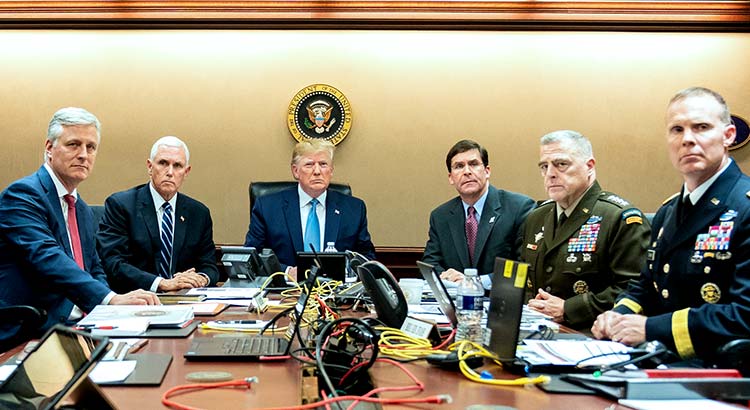The death of fugitive Islamic State leader Abu Bakr al-Baghdadi, killed in a US raid in northwest Syria on Saturday, sparked little controversy among international leaders and the media. It is understandable that the international community is relieved after the death of al-Baghdadi, one of the most sought after international terrorists. After all, the Islamic State has committed mass atrocities, war crimes and other brutal and inhumane acts under his leadership. However, the operation that led to al-Baghdadi’s death should not be taken lightly. If we don’t address cases of targeting operations with enough scrutiny, they might serve as a blueprint for a further normalization of targeted killing practices in the future.
Al-Baghdadi: The leader of the Islamic State
Abu Bakr al-Baghdadi, leader of the Salafi-jihadist group Islamic State (ISIS) and one of the world’s most wanted terrorists was killed in a US military raid this weekend. Al-Baghdadi gained international notoriety when he assumed leadership of the Islamic State of Iraq (the predecessor of ISIS), and expanded its operations into Syria – seizing significant territory there and establishing affiliates in other countries. At the Islamic State’s zenith in 2014, al-Baghdadi declared the establishment of a caliphate in areas under its control with the aim of expanding it throughout the Islamic world and beyond. Even though the group kept losing territory and popular support since the beginning of 2015, it has continued to conduct and instigate violent terrorist attacks on a global level. In March 2019 the US-backed Kurdish-led Syrian Democratic Forces (SDF) captured the last enclave held by ISIS. Despite the loss of their territory in Iraq and Syria, the group has remained a threat to security and stability to the region and the world.
The Operation: What we know
Over the years, multiple attempts have been made to locate and kill al-Baghdadi, mostly by the US or US-backed coalition forces in Syria. He had also been declared dead more than once but has always risen from his assumed grave – that is until late Saturday. Sunday morning, US President Donald Trump declared that the Islamic State leader died when his compound in Barisha in Idlib, northwest Syria, was raided by US Special Operations Forces.
Compared to the majority of targeting operations carried out by the US, the one that killed al-Baghdadi was carried out in an almost old-fashioned way. First, information about his whereabouts was mainly obtained through defectors and SDF forces on the ground gathering intelligence rather than using high-tech surveillance drones. Al-Baghdadi had been under surveillance for some weeks and the operation was launched with the aid of the Kurdish SDF. Second, the actual operation was not carried out using armed drones as is frequently the case. Instead, a US Special Operations Forces team was sent in on helicopters and after being unable to capture al-Baghdadi they pursued him down a dead-end tunnel beneath the compound. Cornered by the troops, al-Baghdadi detonated an explosive vest, killing himself and two of his children he had taken along.
A case of targeted killing?
The circumstances of al-Baghdadi’s death bear remarkable similarities to the most famous targeted killing case against a terrorist leader: the killing of al-Qaeda leader Osama bin Laden in Pakistan. Both operations can be classified as a case study of targeted killings: the deliberate use of force by a state or its agents against a specific individual that is not in the physical custody or in the sphere of influence of this state. Officially, they were termed “capture or kill” operations with the primary aim of capturing the individual and only killing him when capture is not possible. In the case of bin Laden, US government officials admitted that he was more likely to be killed than caught from the outset. The same reasoning applies to the death of al-Baghdadi. Even though he was ultimately not killed by US forces directly, there are indications that the operation was set out as a (targeted) killing rather than a capture mission.
From what the US government has disclosed about the operation so far, the raid on al-Baghdadi was intended to be a capture or kill operation. Due to the secrecy surrounding the operation it is difficult to fully assess the intention whether to kill him or not. However, Defense Secretary Mark Esper clarified “if we didn’t capture him, of course, we were going to kill him”. While he claims that al-Baghdadi would not have been killed had he capitulated, this argument is hardly convincing when evaluated against previous cases. After all, the raid was approved with the strongest possibility that al-Baghdadi would not surrender waving a white flag, thus a situation in which he was killed was the most realistic scenario.
The progressing normalization of targeted killings
The problems of justifying targeted killings as a legitimate counter-terrorism practice do not only apply to the case of al-Baghdadi. With the emergence of transnational terrorism and especially after 9/11 the US increasingly resorted to the use of targeted killings against suspected terrorists on a global level. These operations became an integral part of the US counter-terrorism strategy from 2010 onwards. The US targeted killing campaign against (suspected) terrorists has raised many concerns about the legal and ethical predicaments. Targeted killing practices pose a risk to international law and norms in a twofold manner: The legality of the use of force in the territory of another state (jus ad bellum) and the way in which force is applied and against whom (jus in bello).
One particular worrying trend in regard to jus in bello principles is the high number of civilian casualties in conjunction with targeted killing operations. Civilians get killed or injured as mere bystanders or as the result of incorrect intelligence. Estimates of civilian casualty rates vary broadly, but as the total number of targeted killing operations has increased so has the number of civilians killed. But not only international law protecting civilians from the use of force is jeopardized. The territorial integrity of states is imperilled as well when targeted killing operations are carried out outside official conflict zones. The threats to the sovereignty of states and in some cases even regional stability are expanded through the recurring practice of targeted killings.
Media coverage does not address these problems regarding the operation that led to the death of al-Baghdadi. The same is true for the reaction of state leaders. The case of al-Baghdadi shows that targeted killing operations have gained a certain amount of acceptance among the international community. By not contesting it, the legitimacy of targeted killings is strengthened once again and the aforementioned problems do not seem to be taken into account. The death of al-Baghdadi could set another powerful precedent in normalizing targeted killings beyond insurgent leaders. Eventually, this may deteriorate existing laws and norms.
While some commentators and state representatives stress that this case signifies an important moment in defeating the Islamic State, the significance of al-Baghdadi’s death from a strategic point of view is questionable. Even with al-Baghdadi dead, the Islamic State group will not just disappear. Retaliation by remaining ISIS members is a very real threat. The group might have lost its leader but the withdrawal of US troops from Syria and the subsequent invasion by Turkey might lead to another resurgence of the Islamic State. This is especially the case now as hundreds of IS detainees have already escaped from prison camps held by the SDF. Yet, if strategic considerations cannot be counted as plausible advantages of the strike against al-Baghdadi, what are we left with? In the worst case, the Islamic state will rise again under new leadership but international norms against targeted killing will have ultimately suffered.
Outlook
Undeniably, Abu Bakr al-Baghdadi was the leader of a terrorist organization that perpetrated unspeakable acts of violence, particularly in Syria and Iraq. While al-Baghdadi’s death might be a significant blow to the remains of the Islamic State in Syria in the short term, long-term consequences could include the legitimization of targeted killings as a normal state practice. As the case of al-Qaeda has demonstrated before, these organizations tend to live on with a newly appointed leader, especially when it comes to their franchises around the world. From a strategic standpoint, this targeted killing operation might have not yielded the desired effects. Yet, this episode will most definitely have a greater impact on the practice of targeted killing itself.
The problem does not lie in the death of an individual like al-Baghdadi, it is what comes next. Do we really want to see the normalization of targeted killing as a legitimate state practice? A very real danger arises from this act if it serves as a legal and normative precedent that might undermine existing laws and norms governing the conduct of states. The international community needs to be more vigilant about these instances and how targeted killing operations are justified. The same is true for how understandings of international legal norms that govern the use of force and the territorial integrity of states might change through the continued use of them. If targeted killing practices are perceived as a legitimate means of state affairs, they can become the new normal.


